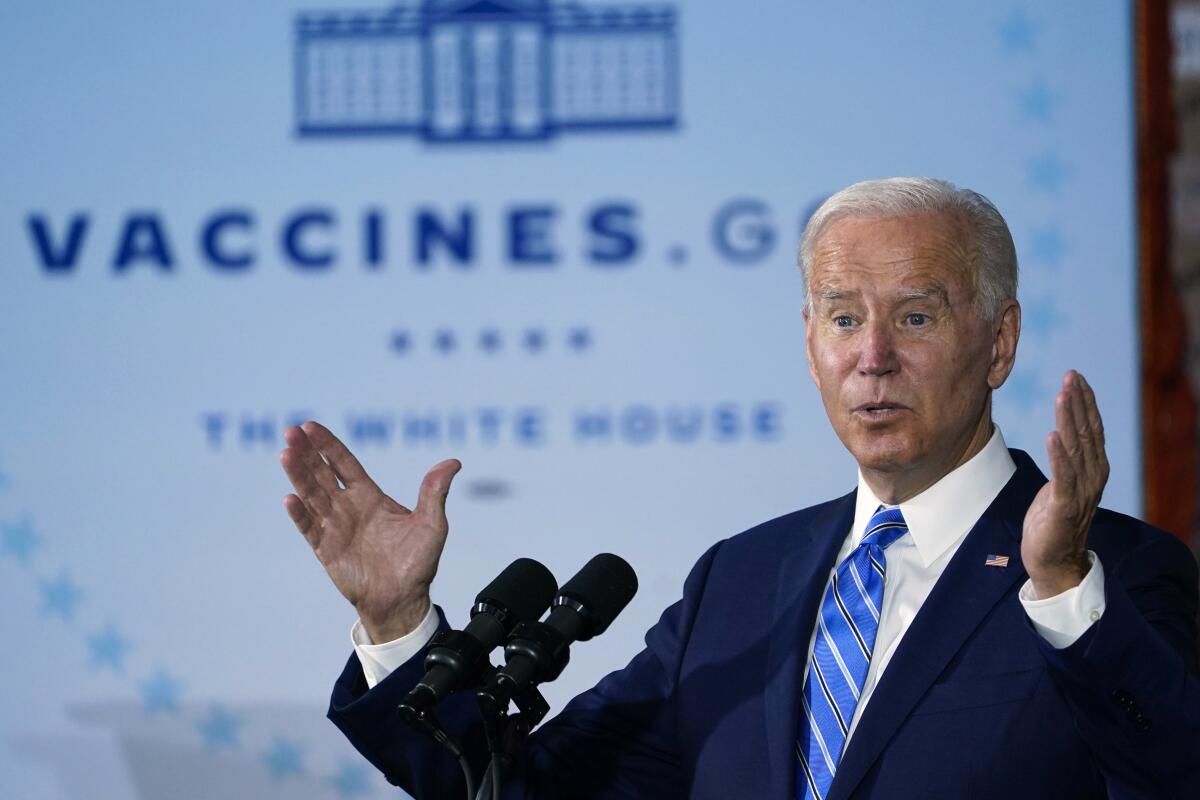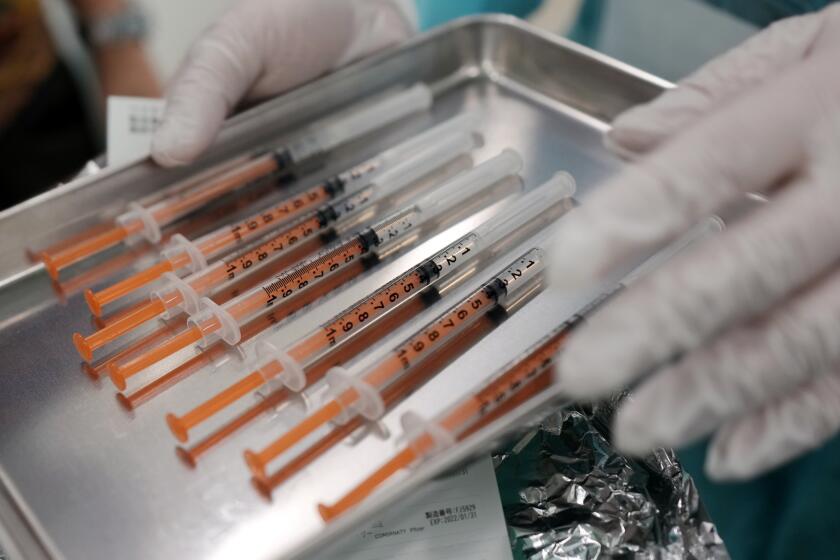What’s the status of Biden’s COVID-19 vaccine mandates?

- Share via
More than half the states are pursuing renewed legal challenges against a requirement from the Biden administration for millions of healthcare workers across the U.S. to be vaccinated against COVID-19.
The vaccine requirement for Medicare and Medicaid providers was one of several mandates the administration imposed upon private-sector employers to try to drive up vaccination rates and slow the spread of the coronavirus.
After a Supreme Court ruling allowed it to go forward, the vaccine requirement for health workers was implemented gradually in all states. But opponents are again trying to stop it, arguing among other things that circumstances have changed as cases tied to the Omicron variant have receded.
Two of President Biden’s other high-profile orders are on hold. The Supreme Court blocked a separate rule that would have required employers with more than 100 workers to be vaccinated or tested weekly for coronavirus infections. And a lower court has blocked a requirement for employees of federal contractors to be vaccinated.
Biden’s various vaccine orders were challenged in court by Republican-led states, conservative groups and some businesses. The lawsuits argued in part that the mandates exceeded federal executive powers and infringed on states’ rights to regulate public health matters.
About 69% of the U.S. population age 5 and older is fully vaccinated against COVID-19.
Here’s an overview of the Biden vaccine mandates that affect the private sector and the status of the legal fights over them.
Health worker mandate
What it would do: Under a rule published Nov. 5 by the Centers for Medicare and Medicaid (CMS), a wide range of healthcare providers that receive federal Medicare or Medicaid funding are to require their workers to be vaccinated. The rule affects doctors, nurses, aides, technicians and even volunteers at hospitals, nursing homes, outpatient surgery centers, home health providers and other medical facilities. It allows exemptions for medical and religious reasons.
The CDC says the requirement covers 10.4 million health care workers at 76,000 facilities.
Who challenged it: The rule was challenged in several lawsuits filed by Republican-led states, mostly in groups. The states argued there were no grounds for an emergency rule, that the CMS had no clear legal authority to issue the mandate and that the rule infringed on states’ responsibilities.
Vaccines and boosters proved highly effective against serious illness from Omicron. But what is also clear is that the defense afforded by vaccines wanes over time.
Where it stands: The Supreme Court on Jan. 13 lifted injunctions that had been issued by lower courts prohibiting enforcement of the healthcare vaccine mandate in about half the states. The CMS subsequently implemented the mandate in several waves.
Health workers were required to have their first dose of the vaccine by Jan. 27 in jurisdictions that had not challenged the mandate in court. The first shot requirement kicked in on Feb. 14 in two dozen other states whose collective lawsuits prompted the Supreme Court decision. The requirement took effect Tuesday in Texas, which had sued separately from the other states.
Sixteen states filed a renewed challenge to the mandate on Feb. 4 in a Louisiana court. They argued that it’s unconstitutional to include some state government agencies in the requirement and that the mandate is not needed because vaccines have been less effective at stopping the spread of the Omicron variant. A coalition of 10 other states raised similar arguments in filing a renewed lawsuit Wednesday in federal court in Missouri.
What’s next: Guidance documents from the CMS indicate it will initially grant leniency to healthcare providers who are showing progress in vaccinating their employees. But providers that don’t eventually have their full staff vaccinated or exempted ultimately could face penalties, including the loss of federal Medicare and Medicaid funding.
Large business mandate
What it would do: Under a rule published by the U.S. Occupational Safety and Health Administration on Nov. 5, businesses with 100 or more workers were to require employees to be vaccinated. If they were not, employees were to be tested weekly and wear masks while working, with exceptions for those who work alone or mostly outdoors. The requirement would have applied to businesses with a combined 84 million employees, and OSHA projected it could save 6,500 lives and prevent 250,000 hospitalizations over six months.
Who challenged it: The requirement was challenged by 27 Republican-led state governments, some conservative and business groups, and some individual businesses. The states mostly filed lawsuits in groups. They argued that the rule exceeded the agency’s powers and that it was the job of states, not the federal government, to deal with public health measures.
The vaccination drive against COVID-19 in the U.S. is grinding to a halt, especially in conservative corners of the country.
Where it stands: The Supreme Court on Jan. 13 blocked the vaccine rule from being enforced. It said OSHA exceeded its authority granted under federal law. The agency subsequently withdrew the rule.
What’s next: Businesses do not have to require their employees to be vaccinated as a result of federal policy, though businesses are free to impose their own requirements in some states.
Federal contractor mandate
What would it do: Under an executive order issued by Biden on Sept. 9, contractors and subcontractors for the federal government are required to comply with workplace safety guidelines developed by a federal task force. That task force subsequently issued guidelines requiring that new, renewed or extended contracts include a clause requiring employees to be fully vaccinated. There are limited exceptions for medical or religions reasons. The requirements could apply to millions of employees.
Who challenged it: The guidelines have been challenged in more than a dozen lawsuits, including seven brought by Republican-led states or coalitions of states. The arguments are similar to those against other vaccine mandates, asserting the Biden administration exceeded the procurement rule making powers granted by Congress, infringed on states’ responsibilities and didn’t properly gather public comment.
Where it stands: The rule is on hold. A federal judge in Georgia issued a ruling Dec. 7 prohibiting enforcement of the requirement for contractors nationally. The nationwide injunction is in addition to rulings by other courts that blocked the requirement only in particular states that sued.
What’s next: The nationwide injunction is on appeal to the Atlanta-based U.S. 11th Circuit Court of Appeals. That court has declined a request by the federal government for expedited consideration of the case.
More to Read
Sign up for Essential California
The most important California stories and recommendations in your inbox every morning.
You may occasionally receive promotional content from the Los Angeles Times.












